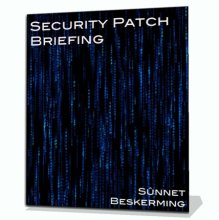OS X 10.5 - Remote hacker automatic control
| Version: | 10.5.x and prior. |
| Technical Details: | AFP Client - Arbitrary code execution due to poor handling of malicious afp:// URLs |
Description: |
Earlier this week Apple released Security Update 2008-002 for Intel and PPC based Macs. Quite a number of fixes were included for a range of serious security problems. |
Mitigation: |
It is recommended that users apply the update, via the Software Update option in the Apple Menu, or via the Apple Download link, below. If installing via the Software Update option, it will only download the applicable Update (Intel / PPC / 10.5 / 10.4). |
Updates: |
http://www.apple.com/support/downloads/ |
Source: |
http://docs.info.apple.com/article.html?artnum=61798 |
Exploits: |
|
| External Tracking Data: | CVE-ID: CVE-2008-0044 (AFP Client), CVE-ID: CVE-2008-0045 (AFP Server), CVE-ID: CVE-2005-3352 (Apache), CVE-ID: CVE-2006-3747 (Apache), CVE-ID: CVE-2007-3847 (Apache), CVE-ID: CVE-2007-5000 (Apache), CVE-ID: CVE-2007-6388 (Apache), CVE-ID: CVE-2007-5000 (Apache), CVE-ID: CVE-2007-6203 (Apache), CVE-ID: CVE-2007-6388 (Apache), CVE-ID: CVE-2007-6421 (Apache), CVE-ID: CVE-2008-0005 (Apache), CVE-ID: CVE-2008-0048 (AppKit), CVE-ID: CVE-2008-0049 (AppKit), CVE-ID: CVE-2008-0057 (AppKit), CVE-ID: CVE-2008-0997 (AppKit), CVE-ID: CVE-2008-0046 (Application Firewall), CVE-ID: CVE-2008-0050 (CFNetwork), CVE-ID: CVE-2007-3725 (ClamAV), CVE-ID: CVE-2007-4510 (ClamAV), CVE-ID: CVE-2007-4560 (ClamAV), CVE-ID: CVE-2007-5759 (ClamAV), CVE-ID: CVE-2007-6335 (ClamAV), CVE-ID: CVE-2007-6336 (ClamAV), CVE-ID: CVE-2007-6337 (ClamAV), CVE-ID: CVE-2008-0318 (ClamAV), CVE-ID: CVE-2008-0728 (ClamAV), CVE-ID: CVE-2006-6481 (ClamAV), CVE-ID: CVE-2007-1745 (ClamAV), CVE-ID: CVE-2007-1997 (ClamAV), CVE-ID: CVE-2007-3725 (ClamAV), CVE-ID: CVE-2007-4510 (ClamAV), CVE-ID: CVE-2007-4560 (ClamAV), CVE-ID: CVE-2007-0897 (ClamAV), CVE-ID: CVE-2007-0898 (ClamAV), CVE-ID: CVE-2008-0318 (ClamAV), CVE-ID: CVE-2008-0728 (ClamAV), CVE-ID: CVE-2008-0051 (CoreFoundation), CVE-ID: CVE-2008-0052 (CoreServices), CVE-ID: CVE-2008-0596 (CUPS), CVE-ID: CVE-2008-0047 (CUPS), CVE-ID: CVE-2008-0053 (CUPS), CVE-ID: CVE-2008-0882 (CUPS), CVE-ID: CVE-2005-4077 (curl), CVE-ID: CVE-2007-6109 (Emacs), CVE-ID: CVE-2007-5795 (Emacs), CVE-ID: CVE-2007-2799 (file), CVE-ID: CVE-2008-0054 (Foundation), CVE-ID: CVE-2008-0055 (Foundation), CVE-ID: CVE-2008-0056 (Foundation), CVE-ID: CVE-2008-0058 (Foundation), CVE-ID: CVE-2008-0059 (Foundation), CVE-ID: CVE-2008-0060 (Help Viewer), CVE-ID: CVE-2008-0987 (Image Row), CVE-ID: CVE-2007-5901 (Kerberos), CVE-ID: CVE-2007-5971 (Kerberos), CVE-ID: CVE-2008-0062 (Kerberos), CVE-ID: CVE-2008-0063 (Kerberos), CVE-ID: CVE-2008-0988 (libc), CVE-ID: CVE-2008-0989 (mDNSResponder), CVE-ID: CVE-2008-0990 (notifyd), CVE-ID: CVE-2007-4752 (OpenSSH), CVE-ID: CVE-2008-0992 (pax archive utility), CVE-ID: CVE-2007-1659 (PHP), CVE-ID: CVE-2007-1660 (PHP), CVE-ID: CVE-2007-1661 (PHP), CVE-ID: CVE-2007-1662 (PHP), CVE-ID: CVE-2007-4766 (PHP), CVE-ID: CVE-2007-4767 (PHP), CVE-ID: CVE-2007-4768 (PHP), CVE-ID: CVE-2007-4887 (PHP), CVE-ID: CVE-2007-3378 (PHP), CVE-ID: CVE-2007-3799 (PHP), CVE-ID: CVE-2008-0993 (Podcast Producer), CVE-ID: CVE-2008-0994 (Preview), CVE-ID: CVE-2008-0995 (Printing), CVE-ID: CVE-2008-0996 (Printing), CVE-ID: CVE-2008-0998 (System Configuration), CVE-ID: CVE-2008-0999 (UDF), CVE-ID: CVE-2008-1000 (Wiki Server), CVE-ID: CVE-2007-4568 (X11), CVE-ID: CVE-2007-4990 (X11), CVE-ID: CVE-2006-3334 (X11), CVE-ID: CVE-2006-5793 (X11), CVE-ID: CVE-2007-2445 (X11), CVE-ID: CVE-2007-5266 (X11), CVE-ID: CVE-2007-5267 (X11), CVE-ID: CVE-2007-5268 (X11), CVE-ID: CVE-2007-5269 (X11), CVE-ID: CVE-2007-5958 (X11), CVE-ID: CVE-2008-0006 (X11), CVE-ID: CVE-2007-6427 (X11), CVE-ID: CVE-2007-6428 (X11), CVE-ID: CVE-2007-6429 (X11) |
Social bookmark this page

 Subscribe to our feed.
Subscribe to our feed.